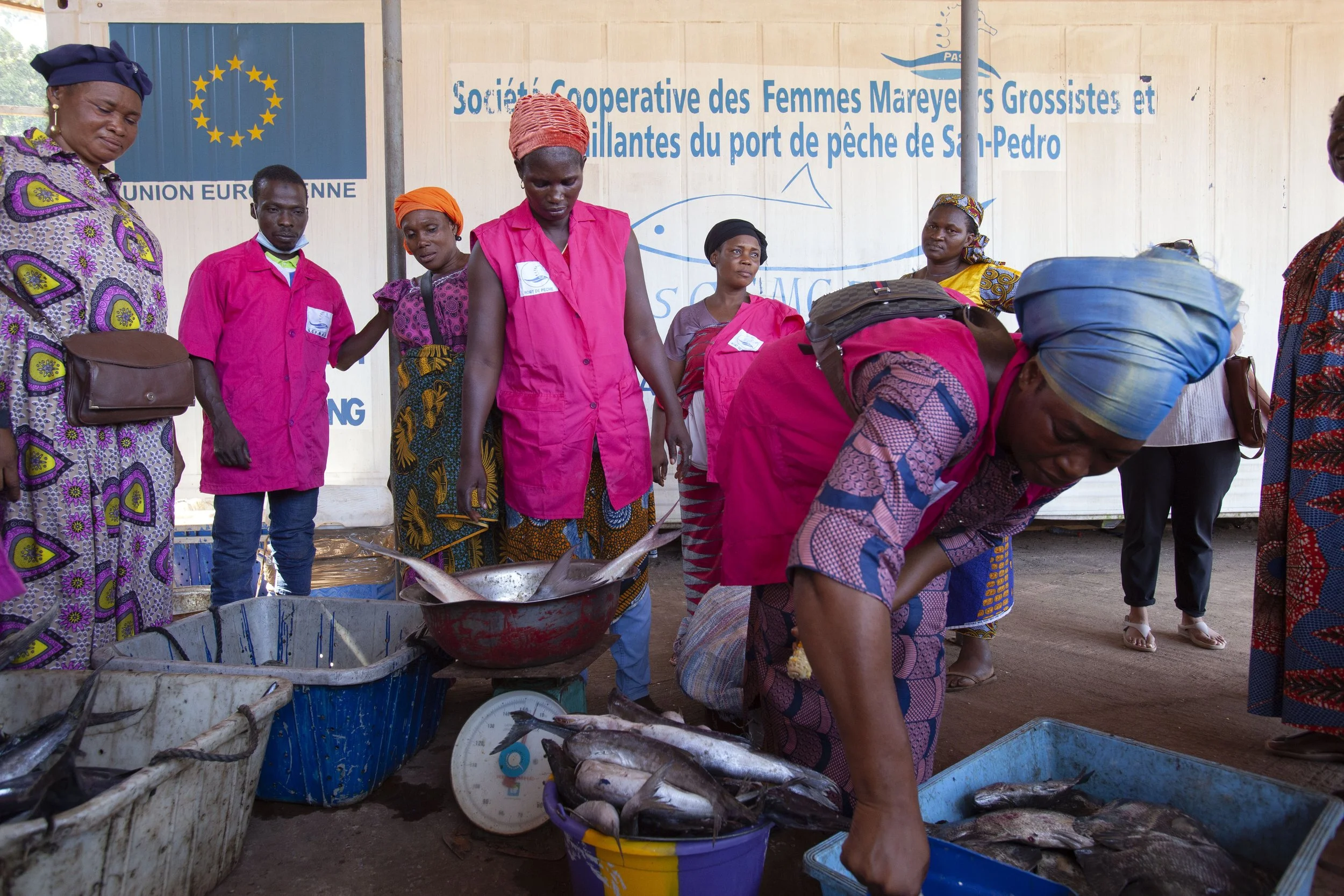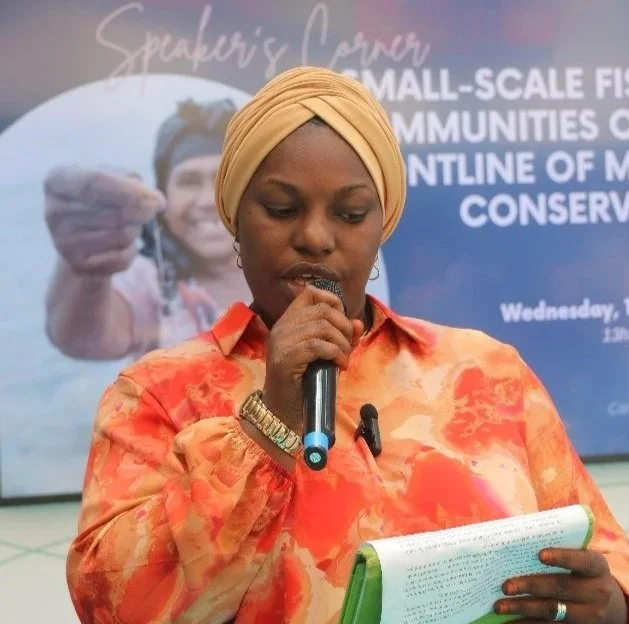When the World Trade Organization (WTO) adopted its Agreement on Fisheries Subsidies in Geneva in 2022, it was hailed as a first step towards curbing harmful public funding to illegal and unsustainable fishing.
To discuss the way forward, a webinar was organised jointly by CAOPA, RiseUp, Stop Funding Overfishing Coalition and CFFA, which brought together a hundred participants, including voices from small-scale fishing communities, policy experts, and WTO representatives. Speakers explored both the implementation of the current agreement as well as the state of the negotiations in Geneva and their concrete implications for small-scale fishing communities, particularly in Africa.
The challenge of protecting small-scale fisheries while addressing unsustainable fishing
Florencia Sarmiento and her colleague Tristan Irschlinger of the International Institute for Sustainable Development (IISD) highlighted that WTO members are currently negotiating new rules to prohibit subsidies that contribute to overcapacity and overfishing. Some exemptions for small-scale fisheries are being discussed in that context. Subsidies for distant water fishing fleets are also on the table: they would be prohibited unless effective fisheries management measures are in place for these fleets’ operations.
Sebastian Mathew, an independent consultant and long-time advocate for small-scale fishers’ rights stressed the importance of the FAO Voluntary Guidelines on Sustainable Small-Scale Fisheries (VGSSF) for the discussion on fisheries subsidies, highlighting that the guidelines, for example, ask states to avoid financial measures that contribute to overcapacity and over-exploitation. He argued that, when discussing a differentiated treatment for small-scale and artisanal fisheries in the WTO negotiations, in order to provide them with some exemptions from the rules on subsidies, exemptions should apply only to fishers using non-towed gears, typically operating vessels under 12 meters. In any case, bottom trawlers should be excluded, regardless of their size. He also insisted the importance that all types of fishing, including small-scale and artisanal fishing, should adopt, after a transition period, measures towards conservation and sustainability.
During the debate following the presentations, a concern was raised about how fuel subsidies for small-scale fisheries – which are currently crucial for their profitability – would be addressed in the context of phasing out subsidies for overfished stocks. Sebastian suggested exploring alternative, more fuel efficient, fishing methods, and emphasized the importance of effective fisheries management in determining the appropriateness of fuel subsidies.
At the national level, the implementation of the WTO agreement on fisheries subsidies could serve to develop initiatives towards sustainable fishing, particularly cold chain infrastructure. Photo: At the port of San Pedro (Côte d'Ivoire), women from the Union of Women Fishmongers and Fish Processors next to a refrigerated container that has contributed to significantly reduce post-harvest losses, by Rich Press.
Jonathan Werner, from the WTO secretariat and manager of the WTO Fish Fund which aims to support countries in implementing the agreement on subsidies, informed that the fund “provides technical assistance and capacity building grants, and has recently closed its first call for proposals, receiving around 100 applications”. He encouraged participants to access the fund's website for more information.
A step forward, but the road is still long
Dawda Saine, CAOPA General Secretary, reminded participants that the 2022 Agreement addresses mainly addresses subsidies linked to illegal, unreported and unregulated (IUU) fishing, while leaving untouched capacity-enhancing subsidies, such as those for vessel construction and for the access of distant water fleets from Asia and Europe that continue to distort global fisheries.
These subsidies keep industrial fleets active long beyond ecological and economic limits. For African coastal states, they translate into fewer fish in nearshore waters, greater competition from foreign vessels, and mounting pressure on small-scale fishers, particularly women working in post-harvest sectors. Djalikatou Cherif Haidara, from the CAOPA member in Guinea, further noted that “as long as these harmful subsidies persist, we perpetuate an unfair system where industrial fleets benefit while small-scale fishers lose access, income, and hope.”
A question of equity
Nowhere is this imbalance clearer than in the operations of distant water fleets in African waters. From CFFA’s perspective, WTO negotiations must recognise that subsidy reform cannot be separated from the dynamics of fisheries access. Limiting overfishing means confronting the incentives that allow distant-water fleets to roam into African exclusive economic zones (EEZs), under fishing access arrangements (chartering, joint ventures), often competing directly with artisanal fishers for the same coastal resources. In this sense, the debate on subsidies to overcapacity is not merely technical, it is fundamentally about justice and sovereignty.
The national level: making subsidy reform an opportunity for SSF
“Artisanal fishworkers must be recognised as legitimate stakeholders in the whole process for both the implementation of the current agreement on fisheries subsidies, and in the ongoing negotiations to curb subsidies that promote overcapacity and overfishing.””
Even if the WTO subsidies agreement remains partial, African governments can seize this moment to start reforming their own subsidy systems. As Dawda Saine emphasised, national implementation should focus on redirecting public support toward sustainable fisheries, as promoted in the 2022 Call to Action from Small-Scale Fishers: safety at sea, cold chain infrastructure, climate-resilient facilities, co-management systems, and community-led surveillance. Such support would not only address immediate needs but would also align with the FAO VGSSF, which call for financial support that enhances sustainability, gender equality, and local value addition.
Who benefits from transparency on subsidies?
One recurring theme of the webinar was the need for greater transparency, and accountability. Governments are obliged to notify their subsidies to the WTO, but, as CAOPA stressed, ‘transparency should not stop in the WTO office in Geneva’. Information on subsidies should be shared nationally, in accessible formats and local languages, so that coastal communities can hold decision makers accountable.
Real transparency means that fishers know who receives what, and for what purpose. It allows civil society to monitor whether public funds are used to strengthen livelihoods or to prop up fleets that deplete resources. In Dawda Saine’s view, “the WTO demand for subsidy notifications must be turned into a tool for democratic oversight, not just a bureaucratic requirement”. He further suggested that “National monitoring committees involving fishers’ organisations and women’s associations can help ensure transparency and fairness in subsidy reforms”.
At the negotiating table, not on the menu: artisanal fishers want more ambitious WTO subsidies rules
The next phase of WTO negotiations, on overcapacity and overfishing subsidies, will be decisive. Will the WTO build a system that rewards sustainability and fairness, or one that legitimise old unfairness, under a new name?
Djalikatou Chérif Haidara, from CAOPA youth wing, speaking at an event at FAO Committee on Fisheries, in Rome, in July 2024. Photo: Mamadou Aliou Diallo.
As Djalikatou Cherif Haidara stressed in her concluding remarks, “the WTO agreement on fisheries subsidies must be anchored in fairness, aligning with the FAO VGSSF and Sustainable Development Goals”. She urged governments to define and disclose harmful subsidies, enhance transparency, and prioritize local food systems over exports.
She also called for ensuring small-scale fishers’ participation in negotiations on overcapacity and overfishing, and for that participation to be genuine and meaningful “the way forward is clear: artisanal fishworkers, both men and women, must be recognised as legitimate stakeholders in the whole process, both at WTO level and at national level, for both the implementation of the current agreement on fisheries subsidies, and in the ongoing negotiations to curb subsidies that promote overcapacity and overfishing: WTO members must complete these negotiations and adopt binding rules on overcapacity and overfishing, in dialogue with our communities”.
For coastal communities, the credibility of the WTO fisheries subsidies disciplines negotiation process will ultimately be measured by whether these rules deliver fairer, more sustainable fisheries.
Header photo: a woman selling fish in Bissau market, in Guinea Bissau, by Carmen Ab-Ali.









The Sustainable Fisheries Partnership Agreement (SFPA) between the EU and Mauritania is an opportunity to implement the “new generation” of agreements announced by the Commission, which should focus on the equitable sharing of benefits, local development, and the well-being of coastal communities that depend on fishing.